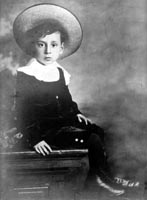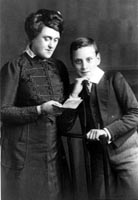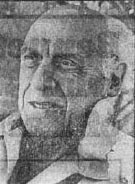 George Coulouris c1907 |
 George and his mother c1913 |
 The contemporary George Coulouris |
The Guardian Saturday February 15 1986
George Coulouris was born in Salford in 1903. But he recovered sufficiently to become a distinguished actor, first appearing on the stage in Rusholme, in Manchester in 1926, and same year playing in Outward Bound at the Old Vic. He spent twenty years in the United States, was nominated for an Oscar, appeared in Citizen Kane; he arrived with only $250 in his pocket, and ended up dining with President Roosevelt. Now he's living in London - but a splendid exhibition of pictures in Salford has reminded him of his own boyhood there.
 George Coulouris c1907 |
 George and his mother c1913 |
 The contemporary George Coulouris |
If I'd woken up one day very early and asked my fairy godmother how I happened to be in Salford, she could only have replied, "Your father was a gutsy little Greek who was not satisfied to starve in a little mountain village in the Pelopponesos but made a zig-zag way which ended him up running The King's Restaurant, Trafford Road, Salford. That's why you're here!
My father had landed in Liverpool with not a word of English, started work as a dock labourer, became the head chef in a Blackpool hotel, opened his restaurant opposite No. 8 Dock Gates, and proudly described himself as "late Chef, of the County Palatine and Lane Ends Hotel". But father really came into his own when, tired of the limited money that came in from the restaurant he began to go into the docks, talk to the captains and buy any junk they were glad to get rid of.
Money for old rope? Old rope was only the beginning. When the first world war started, my father's purchases of junk became monumental and wildly varied. A lot of the stuff had been at the bottom of the sea, torpedoed by the Germans, all brought back to Salford to be refurbished, most of it in a ramshackle yard Dad built of old timber in Aubrey Street, off Trafford Road, a few hundred yards from his restaurant.
How I wish I'd kept the photograph which showed the whole front of the King's Restaurant, the name in big letters overhead and, smiling in the sun underneath, two waitresses in white bib aprons, in between them, my mother standing by the big blackboard on which was chalked day after day "Oxtail Soup 2d, Steak Pudding 6d". I forget the rest of the menu, but I've no doubt it, too, was unchanged day after day.
While my father was buzzing around collecting old rope or drinking ouzo in the cabins of the Greek captains in the docks, my mother was running the restaurant. Just about the time my father was fleeing starvation, my mother was setting off from home in Macclesfield with her little tin trunk at the age of 14 to go into service. She fell in love with my father when she was a chambermaid and he a chef.
I first realised what junk could mean when, at the age of 6, I found myself on the top of a huge mountain of horsehair dumped by my father in a deserted warehouse opposite the shop. He'd bought tons of the stuff, and I found I could leap safely from twenty feet high into a soft valley of it. For three days I arrived home anthrax-ridden and filthy, to be cleaned up by my long suffering mother.
Junk! Miserable to handle, fascinating to look back on. Thousands of strands of soaking hemp looking like drowned blondes' hair, all hung out to dry; thousands of sodden packets of Zig Zag cigarette papers in squashy heaps. What was to be done with them? My brilliant idea meant that I spent Christmas Eve capering around in gym shoes on top of the immense boilers of the Manchester Central YMCA feverishly spreading them out to dry. Next, I typed the usual letter: "Please note that I have for sale a hundred thousand packets of Zig Zag cigarette papers in fairly good condition." There were no takers.
I don't know whether the Parisian pipes were sold. Ordinary looking tobacco pipes: I picked one up, wondering what the little ivory knob under the bowl was for, and discovered the tiny lens disclosing daring French pin-ups. They were in an upstairs room awaiting buyers, along with a lot of brand new motor bikes.
The scarcities of war brought my father a fortune. He'd go to an auction sale of torpedoed or damaged goods, buy something, and, before the sale was over, be offered a thousand pounds profit on his purchase. This made him think he was a genius. He was furious when jealous competitors called him lucky.
The war had other effects. We were foreigners. My father didn't help matters by consistently putting the German case, or what he thought was their point of view, in the little circle gathered in the entrance of the restaurant to discuss the way the war was going. "The sword has been forced into our hands" he would say, quoting the Kaiser.
When the customs officer, the dock clerk and their cronies condemned the Germans for bombing women and children, my father pointed out that it was no worse than the starvation caused in Germany by the British blockade. My mother and I were scared to death by his silly nonsense but he got away with it, which told me that there was some tolerance in the English.
Not for me, though. All my life till I left home I was called a dirty dago, a greasy Greek, asked why I didn't go back home where I came from. One day, when I was 13 1 was looking after Dad's yard. A few tatterdemalion kids came mooching around at the door. I pushed one of them back who was halfway in and closed gate in his face. In a short time there was a howling mob outside, mothers and older kids, calling for my dago blood. I came out, locked the door behind me, pushed my way through them, and ran for my life for home with them chasing me.
My father was true to form during the dock strike. He agreed to supply meals to the 300 extra policemen drafted in to take care of the dockers. As they marched in to the restaurant in batches, they didn't realise that in the backyard a queue of strikers' wives was forming to have soup ladled by my mother into their jugs and bowls from a huge galvanized bathtub.
I was born in Hulton Street, just above Ordsall Park in 1903. When, I was six we moved to Trafford Road I remember musical evenings there. The customs officer sang Asleep In The Deep. My grandmother, half full of stout, yelled, "You can't sing it, you bugger," and the humoured Mr. Furse agreed, "You're right granny, you're right," and gave up.
When I was 12 we moved again to New Park Road; a few steps from the restaurant. It was in the bed there on Sunday mornings in between my father and mother that I first heard the Greek legends about Polyphemus and Ulysses. "Eccy messa katty koussa..." sent mother and me into fits of giggles and my father into a rage, as it was the Greek national anthem he was trying to teach us.
Kids accept the circumstances around them and so did I. In fact I revelled in the Aladdin's Cave of ever changing junk. It never occurred to me that I would ever live anywhere else.
But factors were at work that would get me out of Salford. My mother, had spent some years as the "treasure" of a household when she was in service, and middle-class gentility had got a firm grip on her. She was determined that I would never sink to the level of our poor little neighbours who shuffled off barefoot to board school every morning. Early on she found a little dame school for me. After a couple of years there I found myself at Pendleton Grammar School. Sometimes it was quite an ordeal getting there. The half-mile walk from the tram through the slums around the school gave the slum kids a chance to pick on me from time to time and knock off my maroon and yellow striped cap.
Mr Moir, the emaciated looking rather sadistic Scots headmaster, must have persuaded my mother that I could pass the entrance exam for the famous Grammar School, one of the glories of the city of Manchester. My mother was all for it. She was dying for me to be a little gentleman. Sent off to Sunday school, I endured more catcalls because of the Eton collar and suit she dressed me in. My father's rascality and enterprise, my mother's thrift and hard work in the restaurant, made us comparatively well off.
About this time, we took one of our occasional Sunday walks in the nearby suburb of Urmston. I say suburb; it was almost our idea of the country. We walked down Church Road in the sunshine past palatial detached villas, each with its own front garden.
One of the pleasantest, Oakhurst, had a For Sale board up. My heart leapt and I whispered to my mother, "Why can't we buy that house? We've got enough money now. We don't need to live in Salford any more."
I had soon realised at Manchester Grammar School that I was living in a very strange neighbourhood. Although the school was almost free from snobbery, I couldn't help feeling ashamed that I lived in Salford. My mother's schemes to better me led to my nagging, which my mother joined in, to get my father to buy Oakhurst. He must have been in a good mood that Sunday for he didn't squash the idea immediately. We kept on at him until he made a date to see the old man who owned the house. The price was £800.

There was another little problem about our moving however. Our miserable chattels were too few and to shabby to be taken too. So after several sessions at Oakhurst with the old brewer in his skullcap, it became apparent to my father that he was quite willing to sell everything in his house, and we soon became the owners and residents of a sumptuously furnished Edwardian house right down to the knickknacks in the drawing room - watercolours on the walls, comfortable upholstered armchairs and, most intriguing of all, the wooden wall of the small back dining room which could be made to disappear into the floor above, if we wanted a large salon. We got our new home, lock stock and barrel, front and large back garden, freehold for £1,300. When the sale of our few old bits and pieces in New Park Road was over, the auctioneer turned to my mother to advise her quietly, "You're going up in the world. I know a bit about Urmston, and you mustn't be seen stoning the steps."
We weren't quite clear of Salford yet. The restaurant was closed. My father had taken an office in rooms upstairs, so that was where I spent my days during my last few years in Salford after I'd left school. By that time, I was full of Shakespeare, novels, poetry music, and bitter resentment at my father for not letting me go on to do history at university, which my matriculation with distinction entitled me to do. I knew I couldn't spend the rest of my life in my father's office in Trafford Road, so it wasn't long before I plucked up my courage and ran off to London to become an actor.
For most people Hollywood is a realm of fantasy; I landed up there, but found its brand of fantasy pale by comparison with my junk-filled memories of Salford; and even the fabulous Orson Welles could never displace my father as the most colourful character in my life.

Picture by Shirley Baker, from the Images of Salford exhibition at Salford Art Gallery, 1986